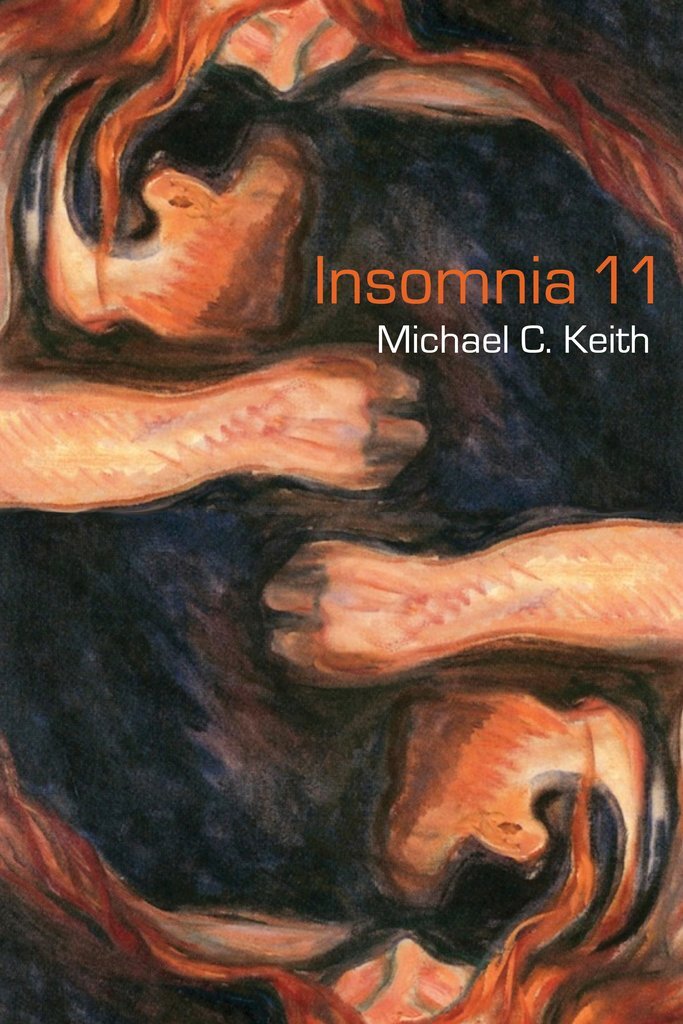Sleepless in Massachussetts: Gregory J. Wolos on Michael C. Keith’s INSOMNIA 11
For this insomniac, Michael C. Keith’s ironic wit and wry humor are as likely to inspire sleeplessness as to cure it. With only a few words, his sketches set our anxieties, neuroses, and fears dancing like hobgoblins into the wee hours. And while we may marvel, even laugh, at the ingenuity of his observations, we are haunted by their familiarity. His micro “Insomnia 7” illustrates the point: “The thought that life is catastrophic kept Kris awake. The realization he was powerless to do anything about it had the same effect.”
Each of the pieces in Keith’s latest collection of microfictions, Insomnia 11, lingers like an amuse-bouche on the palate of the intellect. The book is uniquely structured, divided into eleven sections of eleven stories; each section terminates with an “insomnia” event. The author’s apparent obsession with the number 11 is illustrated in the piece “11:11” in which the narrator notices the unusual frequency with which the “twin digits” appear to him, leading him to conclude that the occurrence is “more than sheer coincidence.” Ultimately irritated by the “mysterious phenomenon,” he chooses to “ignore the iterations and [does] so without consequence. . . for a time.”
The compression demanded by microfiction requires artful efficiency. Word choice and phrasing are of prime significance. Keith, a Professor Emeritus of communications at Boston College and author of multiple academic works on electronic media, is a master of the very short form (see his previous books Stories in the Key of Me and Let Us Not Speak of Extinction). The ironic power of Keith’s “Scorpion in His Coffee,” for example, hinges on his use of an economical double entendre: “As the sun crept above the date grove outside of Marrakesh, Bertrand lifted the cup to his lips and was taken by the beauty of the desert.” The title provides the detail—the scorpion—as well as the dramatic irony investing the phrase “was taken” with its fatal suggestiveness.
In fact, titles are so important to the form that Keith’s are sometimes equal in length to the microfiction itself, as in “Auntie M. Fails to Grasp the Question Posed by the Sky Creatures.” This title is followed by a complete story in a single sentence: “You want to know where the planet’s supply of what is kept?” Occasionally, one of Keith’s titles serves as a punny, ironic commentary on the narrative, as with the story “Faux Paws,” which describes the plight of the “kid who’d lost both hands in a lawn mower accident” and receives a box of colored pencils for Christmas.
The recursive logic of irony—the doubling back, the reconsideration of supposed facts, the coincidences and paradoxes of sound and sense—may help to explain Keith’s choice of “insomnia” as a unifying scaffold for over one hundred disparate pieces. Whether or not the reader experiences the mini-epiphany of a particular micro, the active contemplation inspired by the piece is likely to expand beyond the short time it takes to read it, much as roiling thoughts overflow the fevered minds of the sleepless. “April 47th”, for example, invites readers to contemplate their mortality: “Everything changes when you’re dead.” “Hungry for Love” relates the kind of slight a reader might spend the night chewing over, searching for a snappy rejoinder to a subtle insult: “Sarah knew it was the only time she’d have dinner with the man sitting across from her when he said, ‘You enjoy your food, don’t you?’” “Contact” leads readers to contemplate the liabilities of their very substance: “The visitors were both confounded and intrigued upon discovering Earthlings consisted primarily of liquids. It was the first time they’d encountered a species that would spurt when it was squeezed.”
Keith’s microfictions embody Polonius’s sentiment that “brevity is the soul of wit” by presenting the reader with ironies and paradoxes succinctly, without attempting to embellish, elaborate, or explain. Like spelunkers who forgot their flashlights, sleepless readers are left to explore the depths of each piece as far as their imaginations, intellects, and anxieties will take them. Lurking in the darkness are more questions. What is the reader to make of the title and structure of Insomnia 11? Is there a mystery hidden behind Keith’s obsession with the digits and the scaffolding they lend the volume, or are these actually components of a false-front that mocks (or undercuts) the very idea of structure, leading the reader on a wild-goose chase for meaning?
And is the wry humor of Michael Keith’s microfictions incidental, or is it the point? Don’t expect a direct answer from Keith, though the final piece of the collection, the eponymous “Insomnia 11” might provide a hint: “In his dreams, he couldn’t get to sleep, and it was driving him crazy. When he woke up, he was pleased at how well-rested he felt.” The borderline between sleep and wakefulness is terrain shared by the insomniac and the poet. In his “Ode to a Nightingale,” Keats asks, “Was it a vision, or a waking dream?/ Fled is that music: Do I wake or do I sleep?” It’s possible that we readers who chase Keith’s Insomnia 11 through our sleepless nights will experience poetic epiphanies of our own. If we don’t, at least the breadcrumb paths his micros lead us down offer some diversion in our dullest hours.
—
Gregory Wolos lives, writes, and runs in a small New England town. His short stories have been published or are forthcoming in print and online journals such as Glimmer Train, The Georgia Review, The Florida Review, The Baltimore Review, The Pinch, Post Road, The Los Angeles Review, PANK, and Tahoma Literary Review. His work has earned six Pushcart Prize nominations and his stories have won awards sponsored by Solstice, Gulf Stream, New South, Emrys Review, the Rubery Book Awards, and Gambling the Aisle. His fiction collection Women of Consequence was released by Regal House Publishing in 2019, his second collection, Dear Everyone, by Duck Lake Books in early 2020. and a third collection, The Thing About Men, will be published by Cervena Barva Books in 2021, and his debut novel, Kika Kong vs. the Dead White Males, will be published by Adelaide Books in 2022.





